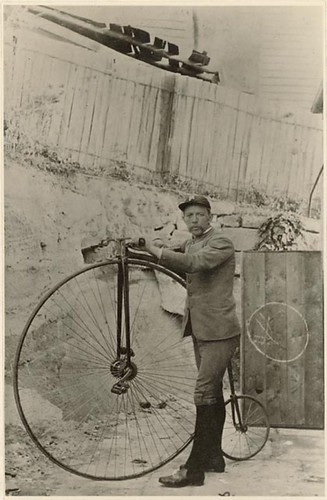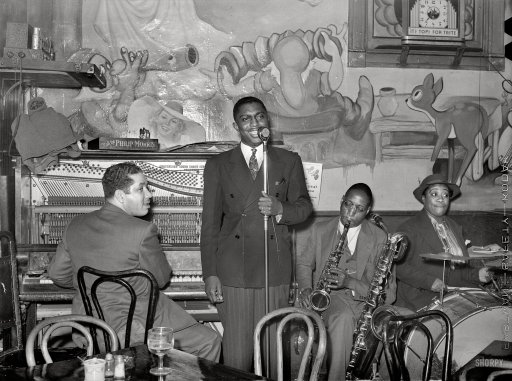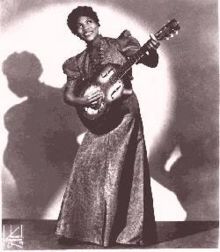Last night I dreamt that Todd Yannacone and I were BFFs on a coach trip together, and were particularly enchanted by some squirrels we saw through the window.
WTF unconscious? I mean,
Last night I dreamt that Todd Yannacone and I were BFFs on a coach trip together, and were particularly enchanted by some squirrels we saw through the window.
WTF unconscious? I mean,

Alfred Lee and penny farthing (aka motherfuckingbike fixie), Glen Street, North Sydney, undated / photographer unknown
This story about nameless creators and recipes reminds me so much of contemporary jazz and swing dance.
Recipes With No Name (Fabio Parasecoli Mar 09, 2012).

I’ve just been reminded of this Shorpy photo (Cafe Society: 1941) by a friend on Faceplant, and it includes a list of black women drummers from this period:
Here’s a list of African American female drummers who may have worked during this time: Henrietta Fontaine, Hetty Smith, Mattie Watson, Helen Cole, Dez Thompson, Rae Scott, and Alma Hightower. I haven’t seen a photo of any of them to compare to the drummer pictured here.
They’re mentioned in the book “Swing Shift: All-Girl Bands of the 1940s” by Sherrie Tucker.
I NEED TO GET MY LEARN ON

Oh, argh. My life is making it difficult for me to find time to do proper service to these posts. And I’m a little tired of just defaulting to women singers. I’d really like to post some women record company administrators, or composers or other people in the music industry. But I guess that’s the point of this whole project: women in music have always found it hard to get into roles other than ‘songbird’ or, at the most, ‘songbird with piano’. A recent Riverwalk Jazz story ‘Not Just Another Pretty Face: ‘Girl Singers’ of the Swing Era’ almost does some solid gender talk in its discussion of women singers in the jazz age.
Incidentally, I’m sorely disappointed by Riverwalk’s only managing to do TWO shows about women in women’s history month. And after those, it’s back to the dick stuff. PLEASE, if I can manage to come up with around sixteen women musicians, surely one of the most famous, most prestigious jazz media can come up with more than two measly stories?
In researching jazz history I’ve come across some really interesting discussions of how particular instruments have been gendered. Krin Gabbard published an article in 1995 called “Signifyin(g) the Phallus: Mo’ Better Blues and Representations of the Jazz Trumpet,” (Representing Jazz, ed. Krin Gabbard. Duke U Press: Durham and London, p 104-130) which discusses the way trumpets functioned, discursively, as phallic imagery. Well, duh. This is partly why Clora Bryant is such an interesting example: woman with trumpet! OMG WIMMINZ HAS THE FALLUS!!! JAZZ IS RUINED!11
Linda Dahl goes into the gendering of musical instruments in Stormy Weather: the Music and Lives of a Century of Jazz Women (Limelight: NY, 1992). I don’t have the book right here in front of me (must buy!), but my notes remind me that she discussed the way music was ubiquitous in domestic life in the late 19th and early 20th centuries, and that this music was ‘home made’. Playing the piano and singing were considered essential parts of a young woman’s development, and were also often positioned in faith contexts – women played the piano or organ in church. Dahl also discusses the way the music industry was very difficult for women to get into, particularly for white women instrumentalists, how the musicians’ union was obstructionist in women’s careers, and the way territory bands were more accessible than mainstream bands. None of these things should surprise us. Indy rock has seen more women musicians than the mainstream (though they seem to be relegated to drums and bass rather than having access to the ultra-phallic lead guitar), and I’m still chasing down ideas about unionism and social power.
So Sister Rosetta Tharpe is an interesting figure. She played the guitar. She mixed church music and blues (shock!), she was a composer, a singer, a solo artist, a musician in a big band (Lucky Millinder’s, most notably), she pwnd all.
I’ve talked about Rosetta Tharpe before. Once as a Thursday cat blogging post, another as a discussion of how the way her guitar tuning was marked by race, class, geography and (implicitly) gender, in Retuning for white audiences – more sister rosetta tharpe.
It’s cool to compare this pretty explicitly sexualised image of the female form (Lonesome Road, with Tharpe singing with the Lucky Millinder band in 1941):
with this video of Sister Rosetta Tharpe singing ‘Up Above My Head’ with a gospel choir, 1960s). Dang – sister is workin’ that power. Safely contained by religion? I don’t think.
(via flopearedmule)
Image ID: 1809924
[Belle Baker (as the title character of Betsy) with Borrah Minnevitch (Minevitch), leader of the Harmonica Symphony Orch… (1926)
As hooked up by Anne Emond
I’ve had a bit of a rough day, so I’m going to post someone easy. Ella Fitzgerald. Because even when she was trying to sing the blues, she couldn’t help but leak joy. She was just made of it.
You can read about her here. My story about Ella is: I’d picked up Ella Fitzgerald sings the Gerome Kern Songbook by accident, and I was totally in love. I did a lot of singing at school and stuff, so I was nuts for someone who could actually sing. This led to my asking for ‘an Ella Fitzgerald CD’ for christmas, still quite a few years before I started dancing, and my dad bought me three. One was all the early stuff, which I thought sounded like rubbish. One was a mixture of bits and pieces, which I liked. It had a pink cover. I can’t remember the other one.
When I started dancing, the one song we used to dance to in class (which I can remember) was a 1945 version of ‘Paper Moon’. I still play it for new dancers today – it’s just a lovely, simple song with a really clear beat.

Ella was my gateway to Basie. It was because of her that I bought One o’Clock Jump, a verve rerelease of an Ella/Basie/Williams CD. I didn’t much like it because Joe Williams irritates me. He still does. But it gave me an idea I’d like Basie. And I do.
That reminds me of another of those nice little Verve rereleases, Ella and Basie!, which was my prize for winning in a jack and jill competition (leading) years and years ago.
My favourites of the later Ella stuff – which is where I think she really shines – are the ‘Ella and Louis’, and ‘Ella and Louis Again‘ Verve rereleases. Those Verve CDs were the perfect gateway drug for a babby swing nerd.
These days I can’t really hack a lot of her early stuff, because they’re just such rubbishy cheesy songs. My favourite is an album Doris put me onto, years and years ago, of stuff recorded with the Chick Webb band, live at the Savoy.
So, for nostalgia’s sake, Ella Fitzgerald singing Paper Moon with the Delta Rhythm Boys (who’re responsible for the best version of ‘Solid as a Rock’ with Basie in 1950):
[photo by Herman Leonard in 1949, and that’s Ray Brown kissing Ella]